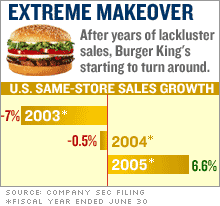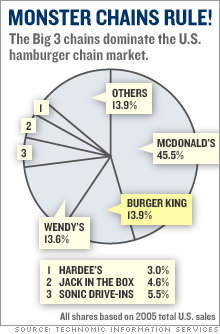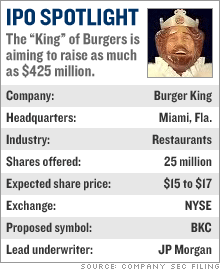|
Burger King IPO set to fire up
Will investors have it their way when the No. 2 burger chain lists on the NYSE?
NEW YORK (CNNMoney.com) - Investors have gorged on restaurant deals this year, but do they have room leftover for Burger King? Burger King is set to raise as much as $425 million in an initial public offering early next week, and while analysts expect the offering to generate a lot of interest from big institutional investors, they say public retail investors may have a harder time making money on the deal.
"Burger King is trying to be more innovative in terms of format, but there's isn't much of a growth story there. I just don't see it having a lot of legs going forward," independent IPO analyst Tom Taulli said. Still, the company has one of the best brands in the industry, and since private equity investors from Texas Pacific Group, Bain Capital Partners and Goldman Sachs Funds bought the No. 2 fast-food hamburger chain more than three years ago, they've returned it to profitability and improved sales. Revenue rose to $1.5 billion in the nine months ended March 31, up 5 percent from the same period a year ago. Net income rose to $37 million in the same nine-month period, up about 18 percent from the year-ago period. "Burger King has fantastic brand equity, and it's already a competitive concept in America due to its long history, its size and its muscle," restaurant industry consultant Allan Hickok said. Investors have had a big appetite for restaurants lately.Chipotle Mexican Grill (Research), the year's top performing offering, has returned about 195 percent this year, and donut chain Tim Horton's (Research) has rallied about 24 percent. But Burger King faces some hurdles ahead, including growth challenges, a management reshuffle and an intensely competitive environment. Extreme makeover
After years of languishing sales, Burger King is finally turning around. The firm has consistently posted positive same-store sales growth over the last two years. (Same-store sales, a measure of sales at stores that have been open for at least a year, are considered an indicator of performance in the retail industry.) The impetus behind the change? Private equity investors. They bought Burger King from British drinks company Diageo in 2002, installed an executive team with a track record of successfully turning around companies and launched a restructuring plan aimed at tapping the company's brand strength, including new marketing campaigns and new product launches. The Miami, Fla.-based company also strengthened its franchise business, which accounts for about 90 percent of its restaurants, and is counting on the success of these franchisees to carry over to its bottom line. But the makeover doesn't come without its price. Most of the money raised from the offering will be used to pay insiders, and Burger King doesn't expect much of it to be invested back in the business. Recent management changes have also raised some investors' eyebrows. Last month, the company said chief executive Greg Brenneman was stepping down to return to his private-equity firm and would be replaced by John Chidsey, the company's chief financial officer. But analysts said the company's management team is solid and that a shakeup at the top doesn't mean the operations of the business will change. Slow growth for fast food
The hamburger chain still faces a tough market share battle at home. It isn't only fighting big rivals like McDonald's and Wendy's for business, but is also competing against regional chains like CKE Restaurants' (Research) Carl's Jr. and Jack in the Box (Research). But the company's very competitive right now, and the stock could be a good bet for investors, according to industry analyst Hickok. "As long as they continue to maintain a pipeline of high-quality product offerings, then there's a great opportunity for the stock to work." Burger King's sales may be picking up steam, but growth in the overall fast-food industry has been weak. U.S. same-store sales at company-owned McDonald's restaurants rose just 4.4 percent last year, and same-store sales at Wendy's stores fell 3.7 percent in the same period. To offset the slumping U.S. market, the burger chain is setting its sights on international markets. The company has added 122 additional restaurants overseas so far this year, matching the total number of restaurants it added abroad in all of last year. Growth may be leveling off in the U.S. restaurant industry, but there's still an upbeat future for the sector, according to Harry Balzer, vice president of The NPD Group, a market research firm. "The restaurant industry has been slowing for the last five years, but it's nowhere near mature. There's still room for growth," he said. ---------------- Here come the big IPOs -- click here.
Click here for more on upcoming IPOs. |
|



